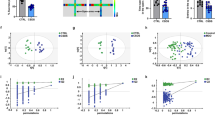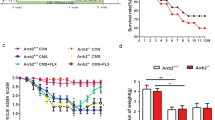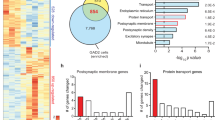Abstract
Augmenting hippocampal neurogenesis represents a potential new strategy for treating depression. Here we test this possibility by comparing hippocampal neurogenesis in depression-prone ghrelin receptor (Ghsr)-null mice to that in wild-type littermates and by determining the antidepressant efficacy of the P7C3 class of neuroprotective compounds. Exposure of Ghsr-null mice to chronic social defeat stress (CSDS) elicits more severe depressive-like behavior than in CSDS-exposed wild-type littermates, and exposure of Ghsr-null mice to 60% caloric restriction fails to elicit antidepressant-like behavior. CSDS resulted in more severely reduced cell proliferation and survival in the ventral dentate gyrus (DG) subgranular zone of Ghsr-null mice than in that of wild-type littermates. Also, caloric restriction increased apoptosis of DG subgranular zone cells in Ghsr-null mice, although it had the opposite effect in wild-type littermates. Systemic treatment with P7C3 during CSDS increased survival of proliferating DG cells, which ultimately developed into mature (NeuN+) neurons. Notably, P7C3 exerted a potent antidepressant-like effect in Ghsr-null mice exposed to either CSDS or caloric restriction, while the more highly active analog P7C3-A20 also exerted an antidepressant-like effect in wild-type littermates. Focal ablation of hippocampal stem cells with radiation eliminated this antidepressant effect, further attributing the P7C3 class antidepressant effect to its neuroprotective properties and resultant augmentation of hippocampal neurogenesis. Finally, P7C3-A20 demonstrated greater proneurogenic efficacy than a wide spectrum of currently marketed antidepressant drugs. Taken together, our data confirm the role of aberrant hippocampal neurogenesis in the etiology of depression and suggest that the neuroprotective P7C3-compounds represent a novel strategy for treating patients with this disease.
This is a preview of subscription content, access via your institution
Access options
Subscribe to this journal
Receive 12 print issues and online access
$259.00 per year
only $21.58 per issue
Buy this article
- Purchase on Springer Link
- Instant access to full article PDF
Prices may be subject to local taxes which are calculated during checkout





Similar content being viewed by others
References
Kojima M, Hosoda H, Date Y, Nakazato M, Matsuo H, Kangawa K . Ghrelin is a growth-hormone-releasing acylated peptide from stomach. Nature 1999; 402: 656–660.
Nakazato M, Murakami N, Date Y, Kojima M, Matsuo H, Kangawa K et al. A role for ghrelin in the central regulation of feeding. Nature 2001; 409: 194–198.
Faulconbridge LF, Cummings DE, Kaplan JM, Grill HJ . Hyperphagic effects of brainstem ghrelin administration. Diabetes 2003; 52: 2260–2265.
Horvath TL, Diano S, Tschop M . Ghrelin in hypothalamic regulation of energy balance. Curr Top Med Chem 2003; 3: 921–927.
Walker AK, Ibia IE, Zigman JM . Disruption of cue-potentiated feeding in mice with blocked ghrelin signaling. Physiol Behav 2012; 108: 34–43.
Perello M, Zigman JM . The role of ghrelin in reward-based eating. Biol Psychiatry 2012; 72: 347–353.
Chuang JC, Perello M, Sakata I, Osborne-Lawrence S, Savitt JM, Lutter M et al. Ghrelin mediates stress-induced food-reward behavior in mice. J Clin Invest 2011; 121: 2684–2692.
Jerlhag E, Egecioglu E, Dickson SL, Engel JA . Ghrelin receptor antagonism attenuates cocaine- and amphetamine-induced locomotor stimulation, accumbal dopamine release, and conditioned place preference. Psychopharmacology 2010; 211: 415–422.
Kanoski SE, Fortin SM, Ricks KM, Grill HJ . Ghrelin signaling in the ventral hippocampus stimulates learned and motivational aspects of feeding via PI3K-Akt signaling. Biol Psychiatry 2013; 73: 915–923.
Diano S, Farr SA, Benoit SC, McNay EC, da Silva I, Horvath B et al. Ghrelin controls hippocampal spine synapse density and memory performance. Nat Neurosci 2006; 9: 381–388.
Lim E, Lee S, Li E, Kim Y, Park S . Ghrelin protects spinal cord motoneurons against chronic glutamate-induced excitotoxicity via ERK1/2 and phosphatidylinositol-3-kinase/Akt/glycogen synthase kinase-3beta pathways. Exp Neurol 2011; 230: 114–122.
Chung H, Kim E, Lee DH, Seo S, Ju S, Lee D et al. Ghrelin inhibits apoptosis in hypothalamic neuronal cells during oxygen-glucose deprivation. Endocrinology 2007; 148: 148–159.
Chung H, Seo S, Moon M, Park S . Phosphatidylinositol-3-kinase/Akt/glycogen synthase kinase-3 beta and ERK1/2 pathways mediate protective effects of acylated and unacylated ghrelin against oxygen-glucose deprivation-induced apoptosis in primary rat cortical neuronal cells. J Endocrinol 2008; 198: 511–521.
Moon M, Kim HG, Hwang L, Seo JH, Kim S, Hwang S et al. Neuroprotective effect of ghrelin in the 1-methyl-4-phenyl-1,2,3,6-tetrahydropyridine mouse model of Parkinson's disease by blocking microglial activation. Neurotox Res 2009; 15: 332–347.
Andrews ZB, Erion D, Beiler R, Liu ZW, Abizaid A, Zigman J et al. Ghrelin promotes and protects nigrostriatal dopamine function via a UCP2-dependent mitochondrial mechanism. J Neurosci 2009; 29: 14057–14065.
Lee JY, Chung H, Yoo YS, Oh YJ, Oh TH, Park S et al. Inhibition of apoptotic cell death by ghrelin improves functional recovery after spinal cord injury. Endocrinology 2010; 151: 3815–3826.
Lee J, Lim E, Kim Y, Li E, Park S . Ghrelin attenuates kainic acid-induced neuronal cell death in the mouse hippocampus. J Endocrinol 2010; 205: 263–270.
Kluge M, Schussler P, Dresler M, Schmidt D, Yassouridis A, Uhr M et al. Effects of ghrelin on psychopathology, sleep and secretion of cortisol and growth hormone in patients with major depression. J Psychiatr Res 2011; 45: 421–426.
Carlini VP, Machado DG, Buteler F, Ghersi M, Ponzio MF, Martini AC et al. Acute ghrelin administration reverses depressive-like behavior induced by bilateral olfactory bulbectomy in mice. Peptides 2012; 2: 160–165.
Lutter M, Elmquist J . Depression and metabolism: linking changes in leptin and ghrelin to mood. F1000 Biol Rep 2009; 1: 63.
Lutter M, Sakata I, Osborne-Lawrence S, Rovinsky SA, Anderson JG, Jung S et al. The orexigenic hormone ghrelin defends against depressive symptoms of chronic stress. Nat Neurosci 2008; 11: 752–753.
Golden SA, Covington HE 3rd, Berton O, Russo SJ . A standardized protocol for repeated social defeat stress in mice. Nat Protoc 2011; 6: 1183–1191.
Patterson ZR, Khazall R, Mackay H, Anisman H, Abizaid A . Central ghrelin signaling mediates the metabolic response of C57BL/6 male mice to chronic social defeat stress. Endocrinology 2013; 154: 1080–1091.
Raspopow K, Abizaid A, Matheson K, Anisman H . Psychosocial stressor effects on cortisol and ghrelin in emotional and non-emotional eaters: influence of anger and shame. Horm Behav 2010; 58: 677–684.
Rouach V, Bloch M, Rosenberg N, Gilad S, Limor R, Stern N et al. The acute ghrelin response to a psychological stress challenge does not predict the post-stress urge to eat. Psychoneuroendocrinology 2007; 32: 693–702.
Ochi M, Tominaga K, Tanaka F, Tanigawa T, Shiba M, Watanabe T et al. Effect of chronic stress on gastric emptying and plasma ghrelin levels in rats. Life Sci 2008; 82: 862–868.
Kristenssson E, Sundqvist M, Astin M, Kjerling M, Mattsson H, Dornonville de la Cour C et al. Acute psychological stress raises plasma ghrelin in the rat. Regul Pept 2006; 134: 114–117.
Asakawa A, Inui A, Kaga T, Yuzuriha H, Nagata T, Fujimiya M et al. A role of ghrelin in neuroendocrine and behavioral responses to stress in mice. Neuroendocrinology 2001; 74: 143–147.
Patterson ZR, Ducharme R, Anisman H, Abizaid A . Altered metabolic and neurochemical responses to chronic unpredictable stressors in ghrelin receptor-deficient mice. Eur J Neurosci 2010; 32: 632–639.
Meyer RM, Burgos-Robles A, Liu E, Correia SS, Goosens KA . A ghrelin–growth hormone axis drives stress-induced vulnerability to enhanced fear. Mol Psychiatry advance online publication, 15 October 2013; doi:10.1038/mp.2013.135 (e-pub ahead of print).
Nakashima K, Akiyoshi J, Hatano K, Hanada H, Tanaka Y, Tsuru J et al. Ghrelin gene polymorphism is associated with depression, but not panic disorder. Psychiatr Genet 2008; 18: 257.
Kubera M, Obuchowicz E, Goehler L, Brzeszcz J, Maes M . In animal models, psychosocial stress-induced (neuro)inflammation, apoptosis and reduced neurogenesis are associated to the onset of depression. Prog Neuropsychopharmacol Biol Psychiatry 2011; 35: 744–759.
Snyder JS, Soumier A, Brewer M, Pickel J, Cameron HA . Adult hippocampal neurogenesis buffers stress responses and depressive behaviour. Nature 2011; 476: 458–461.
Eisch AJ, Petrik D . Depression and hippocampal neurogenesis: a road to remission? Science 2012; 338: 72–75.
Petrik D, Lagace DC, Eisch AJ . The neurogenesis hypothesis of affective and anxiety disorders: are we mistaking the scaffolding for the building? Neuropharmacology 2012; 62: 21–34.
Olson AK, Eadie BD, Ernst C, Christie BR . Environmental enrichment and voluntary exercise massively increase neurogenesis in the adult hippocampus via dissociable pathways. Hippocampus 2006; 16: 250–260.
van Praag H, Kempermann G, Gage FH . Running increases cell proliferation and neurogenesis in the adult mouse dentate gyrus. Nat Neurosci 1999; 2: 266–270.
Van Bokhoven P, Oomen CA, Hoogendijk WJ, Smit AB, Lucassen PJ, Spijker S . Reduction in hippocampal neurogenesis after social defeat is long-lasting and responsive to late antidepressant treatment. Eur J Neurosci 2011; 33: 1833–1840.
Malberg JE, Eisch AJ, Nestler EJ, Duman RS . Chronic antidepressant treatment increases neurogenesis in adult rat hippocampus. J Neurosci 2000; 20: 9104–9110.
Stranahan AM, Khalil D, Gould E . Social isolation delays the positive effects of running on adult neurogenesis. Nat Neurosci 2006; 9: 526–533.
Eisch AJ, Harburg GC . Opiates, psychostimulants, and adult hippocampal neurogenesis: Insights for addiction and stem cell biology. Hippocampus 2006; 16: 271–286.
Santarelli L, Saxe M, Gross C, Surget A, Battaglia F, Dulawa S et al. Requirement of hippocampal neurogenesis for the behavioral effects of antidepressants. Science 2003; 301: 805–809.
Sahay A, Hen R . Adult hippocampal neurogenesis in depression. Nat Neurosci 2007; 10: 1110–1115.
Surget A, Saxe M, Leman S, Ibarguen-Vargas Y, Chalon S, Griebel G et al. Drug-dependent requirement of hippocampal neurogenesis in a model of depression and of antidepressant reversal. Biol Psychiatry 2008; 64: 293–301.
Johansson I, Destefanis S, Aberg ND, Aberg MA, Blomgren K, Zhu C et al. Proliferative and protective effects of growth hormone secretagogues on adult rat hippocampal progenitor cells. Endocrinology 2008; 149: 2191–2199.
Li E, Chung H, Kim Y, Kim DH, Ryu JH, Sato T et al. Ghrelin diectly stimulates adult hippocampal neurogenesis: implications for learning and memory. Endocr J 2013; 60: 781–789.
Moon M, Kim S, Hwang L, Park S . Ghrelin regulates hippocampal neurogenesis in adult mice. Endocr J 2009; 56: 525–531.
Li E, Kim Y, Kim S, Park S . Ghrelin-induced hippocampal neurogenesis and enhancement of cognitive function are mediated independently of GH/IGF-1 axis: lessons from the spontaneous dwarf rats. Endocr J 2013; 60: 1065–1075.
Zigman JM, Jones JE, Lee CE, Saper CB, Elmquist JK . Expression of ghrelin receptor mRNA in the rat and the mouse brain. J Comp Neurol 2006; 494: 528–548.
Zigman JM, Nakano Y, Coppari R, Balthasar N, Marcus JN, Lee CE et al. Mice lacking ghrelin receptors resist the development of diet-induced obesity. J Clin Invest 2005; 115: 3564–3572.
Pieper AA, Xie S, Capota E, Estill SJ, Zhong J, Long JM et al. Discovery of a proneurogenic, neuroprotective chemical. Cell 2010; 142: 39–51.
De Jesus-Cortes H, Xu P, Drawbridge J, Estill SJ, Huntington P, Tran S et al. Neuroprotective efficacy of aminopropyl carbazoles in a mouse model of Parkinson disease. Proc Natl Acad Sci USA 2012; 109: 17010–17015.
MacMillan KS, Naidoo J, Liang J, Melito L, Williams NS, Morlock L et al. Development of proneurogenic, neuroprotective small molecules. J Am Chem Soc 2011; 133: 1428–1437.
Berton O, McClung CA, Dileone RJ, Krishnan V, Renthal W, Russo SJ et al. Essential role of BDNF in the mesolimbic dopamine pathway in social defeat stress. Science 2006; 311: 864–868.
Krishnan V, Han MH, Graham DL, Berton O, Renthal W, Russo SJ et al. Molecular adaptations underlying susceptibility and resistance to social defeat in brain reward regions. Cell 2007; 131: 391–404.
Moser MB, Moser EI . Functional differentiation in the hippocampus. Hippocampus 1998; 8: 608–619.
Fanselow MS, Dong HW . Are the dorsal and ventral hippocampus functionally distinct structures? Neuron 2010; 65: 7–19.
Maggio N, Segal M . Differential modulation of long-term depression by acute stress in the rat dorsal and ventral hippocampus. J Neurosci 2009; 29: 8633–8638.
Tanti A, Rainer Q, Minier F, Surget A, Belzung C . Differential environmental regulation of neurogenesis along the septo-temporal axis of the hippocampus. Neuropharmacology 2012; 63: 374–384.
Czerniawski J, Yoon T, Otto T . Dissociating space and trace in dorsal and ventral hippocampus. Hippocampus 2009; 19: 20–32.
Hock BJ Jr, Bunsey MD . Differential effects of dorsal and ventral hippocampal lesions. J Neurosci 1998; 18: 7027–7032.
Thompson CL, Pathak SD, Jeromin A, Ng LL, MacPherson CR, Mortrud MT et al. Genomic anatomy of the hippocampus. Neuron 2008; 60: 1010–1021.
Banasr M, Soumier A, Hery M, Mocaer E, Daszuta A . Agomelatine a new antidepressant, induces regional changes in hippocampal neurogenesis. Biol Psychiatry 2006; 59: 1087–1096.
Boldrini M, Underwood MD, Hen R, Rosoklija GB, Dwork AJ, John Mann J et al. Antidepressants increase neural progenitor cells in the human hippocampus. Neuropsychopharmacology 2009; 34: 2376–2389.
Kheirbek MA, Hen R . Dorsal vs ventral hippocampal neurogenesis: implications for cognition and mood. Neuropsychopharmacology 2011; 36: 373–374.
Blaya MO, Bramlett HM, Naidoo J, Pieper AA, Dietrich WD . Neuroprotective efficacy of a proneurogenic compound after traumatic brain injury. J Neurotrauma 2013; 31: 476–486.
Tesla R, Wolf HP, Xu P, Drawbridge J, Estill SJ, Huntington P et al. Neuroprotective efficacy of aminopropyl carbazoles in a mouse model of amyotrophic lateral sclerosis. Proc Natl Acad Sci USA 2012; 109: 17016–17021.
Eriksson PS, Perfilieva E, Bjork-Eriksson T, Alborn AM, Nordberg C, Peterson DA et al. Neurogenesis in the adult human hippocampus. Nat Med 1998; 4: 1313–1317.
Moravan MJ, Olschowka JA, Williams JP, O'Banion MK . Cranial irradiation leads to acute and persistent neuroinflammation with delayed increases in T-cell infiltration and CD11c expression in C57BL/6 mouse brain. Radiat Res 2011; 176: 459–473.
Ko HG, Jang DJ, Son J, Kwak C, Choi JH, Ji YH et al. Effect of ablated hippocampal neurogenesis on the formation and extinction of contextual fear memory. Mol Brain 2009; 2: 1.
Wang Y, Neumann M, Hansen K, Hong SM, Kim S, Noble-Haeusslein LJ et al. Fluoxetine increases hippocampal neurogenesis and induces epigenetic factors but does not improve functional recovery after traumatic brain injury. J Neurotrauma 2011; 28: 259–268.
Qiu G, Helmeste DM, Samaranayake AN, Lau WM, Lee TM, Tang SW et al. Modulation of the suppressive effect of corticosterone on adult rat hippocampal cell proliferation by paroxetine. Neurosci Bull 2007; 23: 131–136.
Adams TD, Gress RE, Smith SC, Halverson RC, Simper SC, Rosamond WD et al. Long-term mortality after gastric bypass surgery. N Engl J Med 2007; 357: 753–761.
Thaler JP, Cummings DE . Minireview: Hormonal and metabolic mechanisms of diabetes remission after gastrointestinal surgery. Endocrinology 2009; 150: 2518–2525.
Acknowledgements
These studies were made possible through funding from the NIH (1R01MH085298 and 1R01DA024680 to JMZ; T32DA007290 to AKW through AJE, DA016765 and DA023555 to AJE and 1RO1MH087986 to AAP and Steven L McKnight), institutional funds from University of Iowa Carver College of Medicine to AAP, an International Research Alliance with the Novo Nordisk Foundation Center for Basic Metabolic Research at the University of Copenhagen (to JMZ), the Edward N and Della C Thome Memorial Foundation (to JMR), the Welch Foundation (I-1612; to JMR), NASA (NNX12AB55G to AJE) and an unrestricted endowment provided to Steven L McKnight by an anonymous donor. We also thank Lauren Peca and Shari Birnbaum from the UTSW Medical Center Behavior Core for technical assistance.
Author information
Authors and Affiliations
Ethics declarations
Competing interests
The authors declare no conflict of interest.
Additional information
Supplementary Information accompanies the paper on the Molecular Psychiatry website
Supplementary information
Rights and permissions
About this article
Cite this article
Walker, A., Rivera, P., Wang, Q. et al. The P7C3 class of neuroprotective compounds exerts antidepressant efficacy in mice by increasing hippocampal neurogenesis. Mol Psychiatry 20, 500–508 (2015). https://doi.org/10.1038/mp.2014.34
Received:
Revised:
Accepted:
Published:
Issue Date:
DOI: https://doi.org/10.1038/mp.2014.34
This article is cited by
-
Childhood sexual abuse is associated with higher total ghrelin serum levels in adulthood: results from a large, population-based study
Translational Psychiatry (2023)
-
Application of P7C3 Compounds to Investigating and Treating Acute and Chronic Traumatic Brain Injury
Neurotherapeutics (2023)
-
β1-adrenergic receptors mediate plasma acyl-ghrelin elevation and depressive-like behavior induced by chronic psychosocial stress
Neuropsychopharmacology (2019)
-
Stimulation of entorhinal cortex–dentate gyrus circuitry is antidepressive
Nature Medicine (2018)
-
Neuroprotective efficacy of P7C3 compounds in primate hippocampus
Translational Psychiatry (2018)



